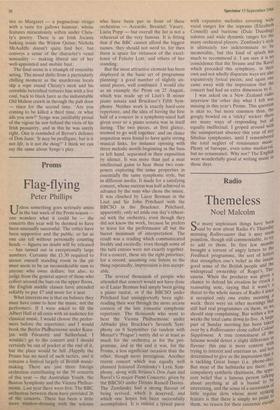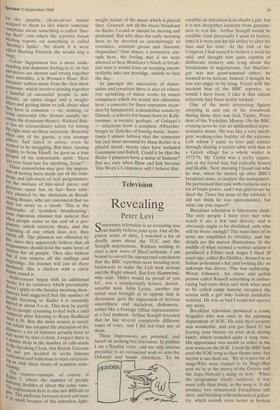Radio
Themeless
Noel Malcolm
So many unpleasant things have been said by now about Radio 4's Thursday morning Rollercoaster that it may seen.' pointless, though still commendable, to try to add to them. Its first few months brought a torrent of angry letters to the Feedback programme, the sort of letters that strengthen, one's belief in the innate good sense of the British people and the widespread ownership of Rogct's The- saurus. When the producer was given 3 chance to defend his creation he struck a reassuring note, saying that it wasn't a threat to the whole nature of Radio 4 since it occupied only one entire morning a week: there were six other mornings that still had real programmes on them, so we „ should stop complaining. But within a le” weeks the total came down to five. A large part of Sunday morning has been take" over by a Rollercoaster clone called Colour Supplement. A true connoisseur of the fatuous would detect a slight difference!' flavour: this one is more content with trying to interest and entertain us, and less determined to give us the impression that it is tackling Great Issues (i.e. phone-ins)" But most of the hallmarks are there: the compulsory synthetic chattiness, the appa- rent belief that a famous person talking about anything at all is bound to he, interesting, and the sense of a succession 01 little regular slots whose most striking feature is that there is simply no point to them, no reason for their existence excep for the punchy, oh-so-clever names assigned to them (a slot where someone complains about something is called 'Sun- day Beef'; one where the reporter Susan ,Marling reports on something is called
Marling's Spike'. No doubt if it were called Marling Dietrich she would sing a song).
Colour Supplement has a more unde-
manding and domestic feeling to it its bits and pieces are shorter and strung together more smoothly, a la Woman's Hour. Rol- lercoaster suffers more from the chat-show sYndrome, which involves putting together a handful of successful people (a mil- lionaire, an opera singer and a weight- lifter) and getting them to talk about what they have in common — viz. nothing, or 'eft successful (the former usually be- comes the dominant theme). Richard Bak- er has an extraordinary talent for hitting the right note on these occasions. Recently When one of his guests, a star teenage athlete, had failed to arrive, even he seemed to be struggling. But then, turning brightly to Irene Handl, he gave us a true glimpse of his indomitable spirit: 'Have You ever been late for anything, Irene?' These concoctions may give the impres- sion of having been made out of the trim- mings and left-overs of real programmes; out the mixture of bite-sized pieces and glutinous sauce has in fact been care- fully planned by the dieticians in Broad- casting House, who are convinced that we 811411 eat more as a result. This is the flminsophy of 'seamless broadcasting'; sonie ingenious planner has noticed that when people come to the end of ea pro- teamme which interests them, and the Puling of one which does not, they ',Witch off. The planners are offended by 'is, since they apparently believe that all programmes should hold the same level of interest for all people. They also believe that if you remove all the endings and beginnings, the listener will just sit there Paralysed, like a chicken with a circle drawn round it. Rollercoaster began with an additional excuse for its existence which presumably d morning S show. urveYs had suggested that the number of 1Pleople listening to Radio 4 is normally due at about 9 a.m. This may be partly Sito people returning to bed with a cold 9rnpress after listening to Brian Redhead one which 6.30. But the main reason is surely ,s11, e which has escaped the attention of the planners; a lot of listeners actually have to art work by nine o'clock. I expect there is , similar drop in the number of calls made t° the Speaking Clock, but British Telecom has not yet decided to invite famous In htacg tismen and ballerinas to start entertain- s with three hours of seamless time- readi11?ng. e counter-example, of course, is 3, where the number of people ilterling doubles at about the same time. The explanation here is also not difficult to 8i ve. The audience between seven and nine is 80 small because of the relentless light-
weight nature of the music which is played then. Granted, not all the music broadcast on Radio 3 could or should be moving and profound. But why does the early morning have to be devoted so unremittingly to overtures, concerti grossi and Slavonic rhapsodies? One senses a protective atti- tude here, the feeling that if we were allowed to hear Bruckner's Ninth at break- fast time it would leave us weeping uncon- trollably into our porridge, unable to face the day.
In amongst the succession of dance- suites and sonatinas there is also an educa- tive sprinkling of minor works by minor composers which we would not otherwise hear: a concerto for three sopranino recor- ders by Sammartini, a mandoline sonata by Dussek, a scherzo for basset-horn by Kalk- brenner, a toccata, perhaps, of Galuppi's — selections from a complete Albrechts- berger to Zelenka of boring music. Some- times I almost believe that the composer has just been invented by Hans Keller in a playful mood: recent ones have included Gassmann and Babell. Could it be that the Radio 3 planners have a sense of humour? But no; only when Blow and Suk become This Week's Composers will 1 believe that.



















































 Previous page
Previous page